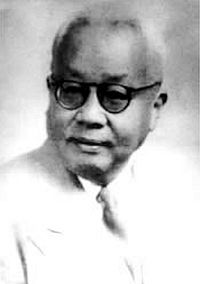Views
Tāng Yòngtóng 湯用彤 (1893-1964)
|
| Notable Associates: |
|
Tāng Yòngtóng 湯用彤 (1893-1964) was an influential Chinese scholar of Buddhist history who was active primarily in the first half of the 20th century. His works are still widely consulted.
Contents |
Biography
Tāng's family was originally from Huángméi County 黃梅縣 in Húběi 湖北, but his father Tāng Lín 湯霖 (a Jìnshì 進士 degree holder) was appointed a county official in Wèiyuán County 渭源縣, Gānsù 甘肅. Before long, his father quit his post and began a private academy, where Tāng studied as a youth.
In the closing years of the Qīng Dynasty, Tāng's family moved to Běijīng 北京, where Tāng eventually tested into the forerunner of Qīnghuá University 清華大學 and graduated in 1917. In 1918, Tāng traveled to the United States. There, he earned his B.A. in philosophy at Hamline University 漢姆林大學 in St. Paul, Minnesota, before going on to study Sanskrit, Pāli, and philosophy at Harvard. He graduated with his Ph.D. in 1922 and returned to China.
Upon his return to China, Tāng took a teaching position at Dōngnán University 東南大學 in Nánjīng 南京. He also taught Pāli at the China Inner Studies Institute 支那內學院 headed by Ōuyáng Jiàn 歐陽漸. There, his students included Lǚ Chéng 呂澂, Wáng Ēnyáng 王恩洋, and Jǐng Chāngjí 景昌極. Tāng briefly took a job at Nánkāi University 南開大學 in Tiānjīn 天津, but with the chaos of the Northern Expedition, he returned to Nánjīng and his old university (newly renamed Central University 中央大學) where he took over as Chair of the Literature Department.
In 1931, Tāng moved to Běijīng and became a professor of philosophy at Běijīng University 北京大學. During the Second Sino-Japanese War, he taught at Southwestern Union University 西南聯合大學, and returned to Běijīng in 1945. He taught Chinese Buddhist history as a visiting professor at the University of California, Berkeley for one year from 1947 to 1948.
In 1948, Tāng became a member of Academia Sinica 中央研究院. The following year, with the establishment of the PRC, he became Vice President of Běijīng University.
Tāng became seriously ill in 1955, and though he recovered, his health was never again as good as it was. He died of heart disease on May 1, 1964.
Tāng's father had been interested in the development of Chinese thought that was based on Lǎozi 老子, Zhuāngzi 莊子, and the Yìjīng 易經, especially during the medieval period. His father had also been interested in Buddhism and its interaction with these strains of thought during that period. These interests had a profound impact on Tāng and the direction of his own scholarly work. During his lifetime, Tāng was interested in the history of Buddhism, with a particular emphasis on the interactions of Buddhism and Chinese thought during the medieval period. His works were far-ranging, and are still used by scholars today all over the world.
Important Works
- Hàn Wèi Liǎngjìn Nánběi cháo fójiào shǐ 漢魏兩晉南北朝佛教史 (History of Buddhism in the Han, Wei, Jin, and Northern and Southern Dynasties). 1938.
- 理學、玄學、佛學
- 隋唐佛教史稿
- 湯用彤學術論文集
- 往日雜稿
- 魏晉玄學講義
- 印度哲學史略
Notable Students
- Rèn Jìyù 任繼愈
Notes
References
- Shì Dōngchū 釋東初. Zhōngguó Fójiào jìndài shǐ 中國佛教近代史 (A History of Early Contemporary Chinese Buddhism), in Dōngchū lǎorén quánjí 東初老人全集 (Complete Collection of Old Man Dongchu), vols. 1-2. Taipei: Dongchu, 1974 Pp. 2.604-609.
- Yú Língbō 于凌波, ed. Xiàndài Fójiào rénwù cídiǎn 現代佛教人物辭典 (A Dictionary of Modern Buddhist Persons), 2 vols. Taipei: Foguang, 2004. Pp. 2.1174c-1177c.
- Chinese Wikipedia Entry
